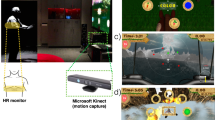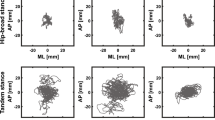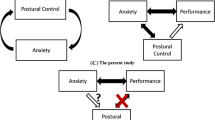Abstract
Attention may be important for actively maintaining posture during computer tasks, resulting in a dual-task tradeoff, where maintaining posture through extrinsic feedback imposes cognitive load. Mindfulness may make intrinsic postural feedback (which imposes less cognitive load) more available. Therefore, we hypothesized that the use of biofeedback would improve posture and negatively impact game performance; additionally, higher levels of mindfulness would be associated with lower game performance costs in the biofeedback condition. Healthy young adult participants played a challenging computer game for 10 min with and without neck length biofeedback, in a counterbalanced repeated-measures design. For each condition, we assessed posture using neck shrinkage (percentage of best), and task performance (computer game score). Neck length was better retained and game performance was worse with biofeedback than without, consistent with the hypothesis that posture biofeedback imposed a cognitive load. In addition, participants with the most neck shrinkage suffered the greatest performance decrements from using biofeedback, and neck length retention during the task without biofeedback was associated with lower self-reported daily neck pain and higher self-reported mindfulness. Thus, those with the greatest need for postural feedback suffer the greatest performance decrements from extrinsic feedback. The results are consistent with the idea that mindfulness enables people to use intrinsic feedback to maintain posture without imposing a dual-task cost.





Similar content being viewed by others
Data availability
Data collected for this study and the associated pilot testing are available by request through the corresponding author and Mind in Movement Lab at the University of Idaho.
Code availability
Proprietary software and hardware provided by Innsport for use with The Motion Monitor system was used to collect data. Additional custom code used to collect data via 3-dimensional motion capture, and Matlab code used for data analysis is available by request through the corresponding author and Mind in Movement Lab at the University of Idaho.
References
Ailneni, R. C., Syamala, K. R., Kim, I. S., & Hwang, J. (2019). Influence of the wearable posture correction sensor on head and neck posture: Sitting and standing workstations. Work, 62(1), 27–35. https://doi.org/10.3233/WOR-182839
Ariëns, G. A., Bongers, P. M., Douwes, M., Miedema, M. C., Hoogendoorn, W. E., van der Wal, G., & van Mechelen, W. (2001). Are neck flexion, neck rotation, and sitting at work risk factors for neck pain? Results of a prospective cohort study. Occupational and Environmental Medicine, 58, 200–207. https://doi.org/10.1136/oem.58.3.200
Baer, J. L., Vasavada, A., & Cohen, R. G. (2019). Neck posture is influenced by anticipation of stepping. Human Movement Science. https://doi.org/10.1016/j.humov.2019.01.010
Becker, J. J., Copeland, S. L., Botterbusch, E. L., & Cohen, R. G. (2018). Preliminary evidence for feasibility, efficacy, and mechanisms of Alexander technique group classes for chronic neck pain. Complementary Therapies in Medicine, 39, 80–86. https://doi.org/10.1016/j.ctim.2018.05.012
Bennett, K. B., & Flach, J. M. (1992). Graphical displays: Implications for divided attention, focused attention, and problem solving. Human Factors, 34(5), 513–533. https://doi.org/10.1177/001872089203400502
Beynon, C., & Reilly, T. (2001). Spinal shrinkage during a seated break and standing break during simulated nursing tasks. Applied Ergonomics, 32(6), 617–622. https://doi.org/10.1016/S0003-6870(01)00038-2
Bishop, S. R., Lau, M., Shapiro, S., Carlson, L., Anderson, N. D., Carmody, J., & Devins, G. (2004). Mindfulness: A proposed operational definition. Clinical Psychology: Science and Practice, 11(3), 230–241. https://doi.org/10.1093/clipsy/bph077
Bonney, R., & Corlett, E. (2002). Head posture and loading of the cervical spine. Applied Ergonomics, 33(5), 415–417. https://doi.org/10.1016/S0003-6870(02)00036-4
Brown, K. W., & Ryan, R. M. (2003). The benefits of being present: Mindfulness and its role in psychological well-being. Journal of Personality and Social Psychology, 84(4), 822–848. https://doi.org/10.1037/0022-3514.84.4.822
Cao, L., Steinborn, M., Kunde, W., & Haendel, B. (2020). Action force modulates action binding: Evidence for a multisensory information integration explanation. Experimental Brain Research, 238(9), 2019–2029. https://doi.org/10.1007/s00221-020-05861-4
Chaffin, D. B., Andersson, G. B., & Martin, B. J. (2006). Occupational Biomechanics (4th edn.). Wiley. ISBN-13:978-0471723431
Chen, S., Ma, X., & Hsu, D. (2020). DinerDash Gym: A Benchmark for Policy Learning in High-Dimensional Action Space. http://arxiv.org/abs/2007.06207
Correia, I. M. T., de Ferreira, A. S., Fernandez, J., Reis, F. J. J., Nogueira, L. A. C., & Meziat-Filho, N. (2021). Association between text neck and neck pain in adults. Spine, 46(9), 571–578. https://doi.org/10.1097/BRS.0000000000003854
DHHS. (1997). Chapter 2 Neck musculoskeletal disorders : Evidence for work-relatedness. In: DHHS (NIOSH) Publication Number 97-141 (pp. 2.1–2.90). Atlanta: National Institute for Occupational Safety and Health Education and Information Division. http://www.cdc.gov/niosh/docs/97-141/
Edmondston, S. J., Chan, H. Y., Chi Wing Ngai, G., Warren, M. L. R., Williams, J. M., Glennon, S., & Netto, K. (2007). Postural neck pain: An investigation of habitual sitting posture, perception of “good” posture and cervicothoracic kinaesthesia. Manual Therapy, 12, 363–371. https://doi.org/10.1016/j.math.2006.07.007
Frantz, W., Cohen, R., & Vasavada, A. (2021). Neck angle, neck length and disc height in functional head and neck postures [conference presentation]. In: 19th Annual Regional Virtual NORA Symposium, University of Utah (p. 2). https://nora.mech.utah.edu/files/2021/04/Utah-NORA-Virtual-Symposium-2021-Abstract-Booklet.pdf
Griegel-Morris, P., Larson, K., Mueller-Klaus, K., & Oatis, C. A. (1992). Incidence of common postural abnormalities in the cervical, shoulder, and thoracic regions and their association with pain in two age groups of healthy subjects. Physical Therapy, 72(6), 425–431. https://doi.org/10.1093/ptj/72.6.425
Haldeman, S., Carroll, L., & Cassidy, J. D. (2010). Findings from the bone and joint decade 2000 to 2010 task force on neck pain and its associated disorders. Journal of Occupational and Environmental Medicine, 52(4), 424–427. https://doi.org/10.1097/JOM.0b013e3181d44f3b
Hawkes, T. D., Siu, K. C., Silsupadol, P., & Woollacott, M. H. (2012). Why does older adults’ balance become less stable when walking and performing a secondary task? Examination of attentional switching abilities. Gait and Posture, 35(1), 159–163. https://doi.org/10.1016/j.gaitpost.2011.09.001
Hlavenka, T. M., Christner, V. F. K., & Gregory, D. E. (2017). Neck posture during lifting and its effect on trunk muscle activation and lumbar spine posture. Applied Ergonomics, 62, 28–33. https://doi.org/10.1016/j.apergo.2017.02.006
Huxhold, O., Li, S. C., Schmiedek, F., & Lindenberger, U. (2006). Dual-tasking postural control: Aging and the effects of cognitive demand in conjunction with focus of attention. Brain Research Bulletin, 69, 294–305. https://doi.org/10.1016/j.brainresbull.2006.01.002
Hwang, J. (2019). Influence of the wearable posture correction sensor on head and neck posture : Sitting and standing workstations. Work, 62, 27–35. https://doi.org/10.3233/WOR-182839
Jha, A. P., Krompinger, J., & Baime, M. J. (2007). Mindfulness training modifies subsystems of attention. Cognitive, Affective, & Behavioral Neuroscience, 7(2), 109–119. https://doi.org/10.3758/CABN.7.2.109
Jorritsma, W., Dijkstra, P. U., De Vries, G. E., Geertzen, J. H. B., & Reneman, M. F. (2012). Detecting relevant changes and responsiveness of Neck Pain and Disability Scale and Neck Disability Index. European Spine Journal, 21(12), 2550–2557. https://doi.org/10.1007/s00586-012-2407-8
Lauche, R., Stumpe, C., Fehr, J., Cramer, H., Cheng, Y. W., Wayne, P. M., & Dobos, G. (2016). The effects of Tai Chi and neck exercises in the treatment of chronic nonspecific neck pain: A randomized controlled trial. Journal of Pain, 17(9), 1013–1027. https://doi.org/10.1016/j.jpain.2016.06.004
Lee, M.-Y., Lee, H.-Y., & Yong, M.-S. (2014). Characteristics of cervical position sense in subjects with forward head posture. Journal of Physical Therapy Science, 26(11), 1741–1743. https://doi.org/10.1589/jpts.26.1741
Li, L., Chen, R., & Chen, J. (2016). Playing action video games improves visuomotor control. Psychological Science, 27(8), 1092–1108. https://doi.org/10.1177/0956797616650300
Lutz, A., Slagter, H. A., Dunne, J. D., & Davidson, R. J. (2008). Attention regulation and monitoring in meditation. Trends in Cognitive Sciences. https://doi.org/10.1016/j.tics.2008.01.005
MacPherson, H., Tilbrook, H., Richmond, S., Woodman, J., Ballard, K., Atkin, K., & Watt, I. (2015). Alexander technique lessons or acupuncture sessions for persons with chronic neck pain: A randomized trial. Annals of Internal Medicine, 163(9), 653–662. https://doi.org/10.7326/M15-0667
Martin, M., & Schumann-Hengsteler, R. (2001). How task demands influence time-based prospective memory performance in young and older adults. International Journal of Behavioral Development, 25(4), 386–391. https://doi.org/10.1080/01650250042000302
McIsaac, T. L., Lamberg, E. M., & Muratori, L. M. (2015). Building a framework for a dual task taxonomy. BioMed Research International. https://doi.org/10.1155/2015/591475
Merriaux, P., Dupuis, Y., Boutteau, R., Vasseur, P., & Savatier, X. (2017). A study of vicon system positioning performance. Sensors (switzerland), 17(7), 1–18. https://doi.org/10.3390/s17071591
Mirelman, A., Herman, T., Brozgol, M., Dorfman, M., Sprecher, E., Schweiger, A., & Hausdorff, J. M. (2012). Executive function and falls in older adults: New findings from a five-year prospective study link fall risk to cognition. PLoS ONE, 7(6), 1–8. https://doi.org/10.1371/journal.pone.0040297
Murray, C., Atkinson, C., Bhalla, K., Birbeck, G., Burstein, R., & Chou, D. (2013). The state of US health, 1990–2010: Burden of diseases, injuries, and risk factors. JAMA-Journal of the American Medical Association, 310(6), 591–608. https://doi.org/10.1001/jama.2013.13805.The
Occupational Safety & Health Administration (2020). Solutions to Control Hazards. Safety and Health Topics-Ergonomics. https://www.osha.gov/SLTC/ergonomics/controlhazards.html
Patchan, M. M., & Puranik, C. S. (2016). Computers & Education Using tablet computers to teach preschool children to write letters : Exploring the impact of extrinsic and intrinsic feedback. Computers & Education, 102, 128–137. https://doi.org/10.1016/j.compedu.2016.07.007
Pink, J. E., & Dodson, C. S. (2013). Negative prospective memory: Remembering not to perform an action. Psychonomic Bulletin and Review, 20(1), 184–190. https://doi.org/10.3758/s13423-012-0337-4
Playfirst. (2006). Diner Dash 2. Version 1.13.1, Microsoft Windows. Playfirst. https://shockwave.com/gamelanding/dinerdash2.jsp
Reber, R. (2014). Mindfulness in education. In: A. Ie, C. T. Ngnoumen, & E. J. Langer (Eds.), The Wiley Blackwell Handbook of Mindfulness (Vol. 1–2, pp. 1054–1070). Wiley. https://doi.org/10.1002/9781118294895.ch54
Sanders, M. S., & McCormick, E. J. (1993). Human Factors in Engineering and Design (7th ed.). New York: McGraw-Hill. ISBN-13:978-0070549012
Sanger, K. L., & Dorjee, D. (2015). Mindfulness training for adolescents: A neurodevelopmental perspective on investigating modifications in attention and emotion regulation using event-related brain potentials. Cognitive, Affective and Behavioral Neuroscience, 15(3), 696–711. https://doi.org/10.3758/s13415-015-0354-7
Silva, A. G., Punt, T. D., Sharples, P., Vilas-Boas, J. P., & Johnson, M. I. (2009). Head posture and neck pain of chronic nontraumatic origin: A comparison between patients and pain-free persons. Archives of Physical Medicine and Rehabilitation, 90(4), 669–674. https://doi.org/10.1016/j.apmr.2008.10.018
Simpson, L., Maharaj, M. M., & Mobbs, R. J. (2019). The role of wearables in spinal posture analysis: A systematic review. BMC Musculoskeletal Disorders, 20(1), 1–14. https://doi.org/10.1186/s12891-019-2430-6
Sze, J. A., Gyurak, A., Yuan, J. W., & Levenson, R. W. (2010). Coherence between emotional experience and physiology: Does body awareness training have an impact? Emotion, 10(6), 803–814. https://doi.org/10.1037/a0020146
Vasavada, A. N., Nevins, D. D., Monda, S. M., Hughes, E., & Lin, D. C. (2015). Gravitational demand on the neck musculature during tablet computer use. Ergonomics (Taylor & Francis). https://doi.org/10.1080/00140139.2015.1005166
Verhaeghen, P., & Cerella, J. (2002). Aging, executive control, and attention: A review of meta-analyses.Neuroscience and. Biobehavioral Reviews, 26(7), 849–857. https://doi.org/10.1016/S0149-7634(02)00071-4.
Vernon, H., & Mior, S. (1991). The Neck Disability Index: A study of reliability and validity. Journal of Manipulative and Physiological Therapeutics, 14(7), 409–415. https://doi.org/10.1300/J094v04n04_09
Woollacott, M., & Shumway-Cook, A. (2002). Attention and the control of posture and gait: A review of an emerging area of research. Gait and Posture, 16(1), 1–14. https://doi.org/10.1016/S0966-6362(01)00156-4
Yogev-Seligmann, G., Hausdorff, J. M., & Giladi, N. (2008). The role of executive function and attention in gait. Movement Disorders, 23(3), 329–342. https://doi.org/10.1002/mds.21720
Acknowledgements
We thank the Mind in Movement Lab team members (Addison Johnson, Brittanee West, Emily Botterbusch, Jordan Becker, Makayla Sundquist, Wilson Trusty, Skylar Soelberg, and Daniel Kral) for help with data collection. Funding for this research was provided through a seed grant from the University of Idaho.
Funding
Funding for this study was provided to Mind in Movement Lab by the University of Idaho seed grant.
Author information
Authors and Affiliations
Corresponding author
Ethics declarations
Conflict of interest
The authors declare that they have no conflict of interest.
Ethics approval
The experiment and pilot data published herein have been approved by the University of Idaho IRB. The procedures used in this study adhere to the tenets of the Declaration of Helsinki and its later amendments.
Consent to participate
All participants provided written informed consent, and received course credit for a two-hour data collection session.
Consent for publication
All participants provided consent to publish data and images associated with the study when agreeing to participate in this study.
Additional information
Publisher's Note
Springer Nature remains neutral with regard to jurisdictional claims in published maps and institutional affiliations.
Rights and permissions
About this article
Cite this article
Baer, J.L., Vasavada, A. & Cohen, R.G. Posture biofeedback increases cognitive load. Psychological Research 86, 1892–1903 (2022). https://doi.org/10.1007/s00426-021-01622-2
Received:
Accepted:
Published:
Issue Date:
DOI: https://doi.org/10.1007/s00426-021-01622-2




